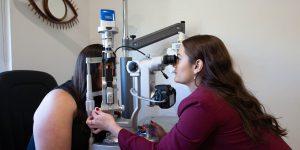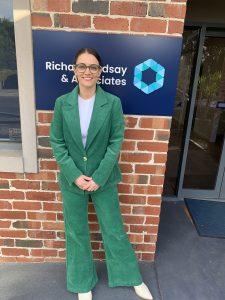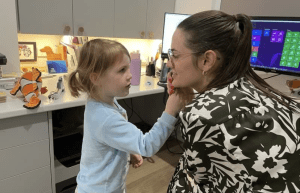1:30min
 Optometrist Jillian Campbell has had a bustling year, from purchasing her very first practice in Victoria, to securing a coveted spot in the World Council of Optometry’s leadership and advocacy course.
Optometrist Jillian Campbell has had a bustling year, from purchasing her very first practice in Victoria, to securing a coveted spot in the World Council of Optometry’s leadership and advocacy course.
In 2013, Jill completed her master’s degree at Queensland University of Technology (QUT), before taking a leap of faith and travelling to Melbourne for a clinical residency at the Australian College of Optometry (ACO). Although the transition was far from easy, Jill was determined to make it work.
‘Some people thought I was crazy for making such a bold move, but I knew I wanted to continue studying and challenge myself. And challenge myself I did!’ Jill said.
‘The first week was a bit of a debacle – I had more luck finding a needle in a haystack than finding a place to live. But being the determined person that I am, I refused to let a pesky little thing like homelessness ruin my plans. I ended up spending two full years at the ACO, immersing myself in the wild and wacky world of contact lenses.’
Taking on the role of practice owner
 After the two-year stint at the ACO, Jill joined Richard Lindsay & Associates in 2015.
After the two-year stint at the ACO, Jill joined Richard Lindsay & Associates in 2015.
‘The ACO exposed me to a wealth of pathology, which was incredibly rewarding, and helped me rapidly enhance my clinical skills. After hearing about a job opportunity at Richard Lindsay & Associates, I went through two interviews and a trial before being hired. It wasn’t easy – Richard certainly put me through my paces with multiple interviews and a trial – but I eventually landed the job.’
Fast forward seven years, and she is now the proud owner of the practice.
‘Taking the plunge and acquiring my own practice was a fulfilling and exciting experience, and something I had always envisioned for myself. This was the kind of practice I’ve always wanted to own – full scope, independent and specialising in contact lenses.
‘However, I must admit that I am still surprised I managed to make it happen. One of the major adjustments I had to make was learning not to catastrophise every small issue that arose. I realised the importance of dealing with each problem as it comes and not allowing it to snowball into a cascade of imagined future problems.
‘The biggest challenge I faced was the natural shift in relationships that occurred. I had been working alongside my colleagues for the past seven years, and becoming their boss changed the dynamics. It was an adjustment to transition from being their colleague to their supervisor. I learned that it’s not possible to simultaneously be their best friend and their boss.’
But amidst the challenges, there are moments that make it worthwhile.
‘One of the biggest highlights of being a practice owner was the ability to treat myself to not just one but two new pairs of glasses! But on a more sentimental (and serious) note, the overwhelming support and well-wishes I have received from the industry and our patients have been truly heart-warming. Even now, patients who come in for their appointments remember my recent purchase and continue to send me gifts.’
Handpicked for prestigious WCO course
In May this year, Jill discovered that she was one of few to be selected for the World Council of Optometry’s 2023 Optometry Program in Advocacy and Leadership (OPAL) course.
‘I was motivated to apply for the OPAL course because I had previously completed a health sector leadership program in 2019 and found it incredibly rewarding. I enjoyed the experience and realized that there was still so much more I could learn and accomplish in terms of leadership and advocacy.
‘Advocacy gives us the opportunity to influence policies, practices and attitudes that impact our professional fields and the lives of those we serve. It allows us to speak up for the needs and rights of patients, address systemic challenges, and promote positive change.
‘In my own life and career, I have witnessed instances where individuals were not receiving the care that they deserved due to barriers and limitations within the system. These experiences have inspired me to become a passionate advocate, as I believe in the power of advocacy to drive equitable access to quality healthcare and create a positive impact on people’s lives.’
Held from 1 June to 28 August, the interactive OPAL course enables future eye health leaders to use advocacy and leadership strategies to effect change at policy and practice levels. It also aims to equip participants with the knowledge and skills to lead the optometry profession forward through advocacy, public health initiatives and leadership.
‘I’m particularly interested in learning effective communication strategies, building strong networks, understanding policy-making processes and developing the skills to influence positive change within these fields.
‘Having just bought my own practice in March this year, the leadership skills will be very helpful for my new role as boss. With the knowledge I’ll gain from OPAL, I’ll lead my practice confidently and drive its success in healthcare.’
A day in Jill’s shoes
 What does a typical day look like for Jill, a young and dynamic practice owner and optometrist, with a vibrant Instagram presence and a strong commitment to furthering her leadership and advocacy skills?
What does a typical day look like for Jill, a young and dynamic practice owner and optometrist, with a vibrant Instagram presence and a strong commitment to furthering her leadership and advocacy skills?
‘I’m an early riser, waking up at 5am on most weekdays! I use this time to exercise, meditate, journal and dedicate some time to learning something new. This routine became a part of my life during the pandemic when I immersed myself in self-improvement books, with Robin Sharma’s, “The 5 AM club”, being particularly influential.
‘I usually arrive at work around 7:30am to prepare for the day ahead, to set up equipment, review the cases of my more challenging patients and plan contact lens fits. Throughout the day, it varies how many patients I’ll see – I probably average at around 12. Occasionally, there are emergencies that require immediate attention, and they are squeezed in. In addition to patient care, I provide guidance to my team on patient management, write letters, place contact lens orders and handle other necessary administrative tasks.’
Maintaining work-life balance is an ongoing process
‘In the first three months of owning the practice, I definitely stretched myself thin. I had numerous commitments, including writing lectures, reviewing articles, fulfilling bridesmaid duties, training our fifth optometrist and managing multiple optometrists on annual leave. This led to me sacrificing my exercise routine, early mornings, late nights and my ability to immediately dive into my work.
 ‘However, I quickly realized that this unsustainable lifestyle took a toll on my health. I ended up with a nasty chest infection that took weeks to get over fully, which was not surprising given the stress I put myself through. Our bodies have a way of forcing us to rest when we push ourselves too hard. I’ve come to understand the importance of not compromising on the time I need for exercise and personal wellbeing. Ironically, during stressful times, taking care of yourself becomes even more crucial.’
‘However, I quickly realized that this unsustainable lifestyle took a toll on my health. I ended up with a nasty chest infection that took weeks to get over fully, which was not surprising given the stress I put myself through. Our bodies have a way of forcing us to rest when we push ourselves too hard. I’ve come to understand the importance of not compromising on the time I need for exercise and personal wellbeing. Ironically, during stressful times, taking care of yourself becomes even more crucial.’
In addition to her role at Richard Lindsay & Associates, Jill also works as a lecturer and clinical supervisor at the University of Melbourne, where she completed two postgraduate specialist certificates. She has also volunteered overseas in Vanuatu and India, and previously worked with the Brien Holden Vision Institute. While she makes this balancing act look easy, her best advice is to prioritise self-care.
‘Dedicate time for activities that recharge you and bring you joy. It’s tempting to let these activities fall by the wayside when overwhelmed, but they are precisely what we need to cope with stress. Remember that finding work-life balance is an ongoing process, and it’s okay to make adjustments along the way to ensure your overall wellbeing.’
Tagged as: Advocacy & government, early career optometrist